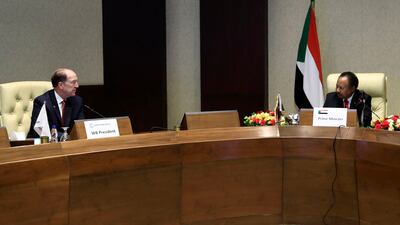UN Secretary General Antonio Guterres on Thursday urged world powers to boost financial aid to the cash-strapped, transitional government in Sudan, which survived this month's coup attempt but is battling inflation, poverty and other threats.
Addressing a pledging conference to support Sudan’s pathway to civilian, democratic rule, Mr Guterres warned of the African country’s “unsustainable debt burden” and “complex security challenges” such as this month’s failed coup.
Sudan has been under civilian rule since the overthrow of former leader Omar Al Bashir in 2019, but its long-standing economic woes persisted, with power cuts, medicine shortages, a devalued currency and inflation at nearly 400 per cent.
The country has “undertaken ambitious economic reforms” that make it eligible for International Monetary Fund support that “will allow a measure of relief from Sudan’s unsustainable debt burden,” said Mr Guterres.
“The international community must do everything possible to help advance these and other efforts,” Mr Guterres told the online gathering of donors that was part of the UN General Assembly in New York.
Sudan paved the way for relief on more than $50 billion in foreign debt this year, unlocking access to global finance. The World Bank says it will commit some $2bn in grants to fight poverty and inequality and boost growth over the coming year.
Mr Guterres said Sudan has passed “important milestones” on democratic reforms and cutting peace deals with armed wings of minority ethnic groups, but some 13 million people still rely on aid and the failed putsch was a “reminder of persistent threats”.
“It underscores the importance of undertaking all efforts to protect civilians, strengthen human rights, and provide safety and security for all,” said the UN chief.
In a visit to Sudan on Thursday, World Bank chief David Malpass said the country was making progress as it reconnects with the global economy but was still struggling with shortages and attracting investment.
“Sudan is making a transition from a violent situation, from a situation of shortages to the situation that is gradually improving,” Mr Malpass said after meeting Sudanese Prime Minister Abdalla Hamdok.
“It takes time to go through this process and it will be important for people to approach it with patience and with tolerance for each other knowing that the whole that Sudan's building — a nation — is going to be stronger than the individual parts.”
Sudan's economy has been mired in a crisis that led to the overthrow of Al Bashir in 2019 and has continued since. Inflation slowed slightly last month to 388 per cent and a sharply devalued currency has shown signs of stabilising, but many Sudanese struggle with poverty.
Last week, authorities said they had thwarted an attempted coup led by people linked to Al Bashir. On Thursday, civilian activists were calling for pro-democracy protests in the capital Khartoum.


